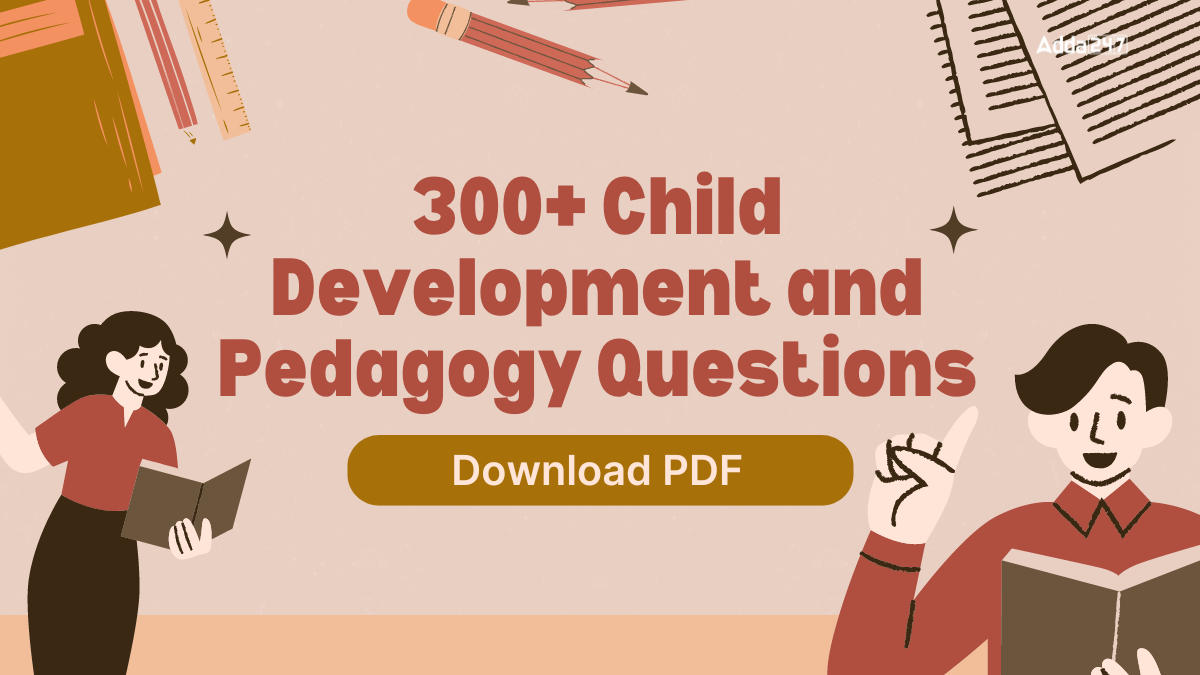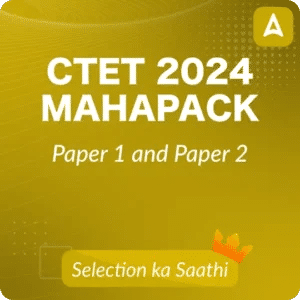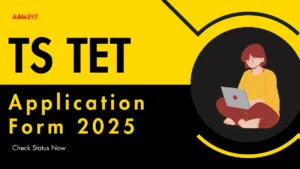Table of Contents
Child Development & Pedagogy (CDP) is a key subject for succeeding in teaching exams. With several TET exams scheduled one after another this year, it’s essential to begin preparation without delay. CDP is included in both CTET Paper 1 and CTET Paper 2, making it an important focus for candidates.
Important Child Development & Pedagogy Questions for the CTET Exam
The Child Development & Pedagogy section holds a weightage of 30 marks in each paper. This subject helps teachers gain an understanding of the educational psychology of children, which is crucial for effective teaching and learning in the classroom. Additionally, Child Pedagogy offers a pedagogical framework to assist teachers in creating effective evaluation and assessment strategies, as well as designing meaningful learning experiences for their students.
CDP Questions and Answers
The CTET and STET exams consist of 30 questions in each paper, with a total of 30 marks per paper. Each correct answer is awarded 1 mark, and there is no negative marking. The question pattern is objective-type, and the exam is bilingual. For CTET Paper 1, the difficulty level corresponds to up to Class 8, while Paper 2 is designed for up to Class 10. The Hindi exam pattern is based on the primary level for Paper I and the upper primary level for Paper II. In the Child Development & Pedagogy section, the weightage is as follows: 15 questions on Child Development, 5 questions on the Concept of Inclusive Education and Understanding Children with Special Needs, and 10 questions on Learning and Pedagogy.
| Exam | CTET & STET | |
| Total Questions | 30 questions (in each paper) | |
| Total Marks | 30 marks (in each paper) | |
| Marking | For the right answer 1 mark | |
| Negative Marking | No | |
| Question Pattern | Objective type | |
| Language | Bilingual | |
| Difficulty level for CTET Paper 1 | Up to 8th Class | |
| Difficulty level for CTET Paper 2 | Up to 10th Class | |
| Examination pattern of Hindi | based on the primary level for Paper I and the upper primary level for Paper II. | |
| Child Development & Pedagogy Weightage |
|
|
Child Development and Pedagogy Questions Weightage in Teaching Exam
Child Development & Pedagogy Section is asked in all TET exams. It comprises 30 Questions in each paper i.e. Paper I and Paper II. Each Question carries one mark. Here we are listed in which exam Child Development & Pedagogy questions will be asked
| TET Exam | Total Marks | Number of Questions Asked |
| CTET Paper 1 | 30 Marks | 30 |
| CTET Paper 2 | 30 marks | 30 |
| REET Paper 1 | 30 Marks | 30 |
| REET Paper 2 | 30 marks | 30 |
| UTET Paper 1 | 30 marks | 30 |
| UTET Paper 2 | 30 marks | 30 |
| MPTET Primary Teacher | 30 marks | 30 |
| UGC NET | 10 marks | 5 |
| DSSSB PRT | 100 | 100 |
| DSSSB TGT | 10-15 | 10-15 |
| DSSSB PGT | 20-25 | 20-25 |
| KVS PRT | 20 | 20 |
| KVS TGT | 40 | 40 |
| KVS PGT | 20 | 20 |
| SUPER TET | 20 | 20 |
| NVS TGT | 15 | 15 |
| NVS PGT | 20 | 20 |
CDP Questions Topics
Check important questions on the Child Development and Pedagogy Section. CTET 2024 will be conducted in several languages in various cities, all over the nation. As candidates don’t have much time left for preparation and this is the time when candidates need to focus on the main & main topics.
| S.No. | Topic | Mostly Asked Topics |
| 1. | Growth & Development | Influencing factors |
| 2. | Cognitive Theories | Piaget, Kohlberg, Vygotsky |
| 3. | Intelligence & Its Theories | IQ, ZPD, Other intelligence theories & Test. |
| 4. | Language Theories | Language acquisition & its Challenges, Chomsky & Vygotsky language |
| 5. | Learning Disabilities | Dyslexia, Autism, ADHD & specially Abled Child |
| 6. | Learning Theories | Laws of Learning, Theories, Behaviourism theories, teaching methods |
| 7. | Motivation | Maslow Hierarchy, Reinforcement & Punishment |
| 8. | Cognition & Emotions | Freud’s Personality Theory |
| 9. | Heredity & Environment | Influencing Factors of Learning |
| 10. | Gender Issues | Application based Questions |
| 11. | Inclusive Education | Govt. Norms, Define, Features |
| 12. | Evaluations | School-Based Assessment, Formative Assessment, Summative Assessment, CCE (Scholastic & Co- Scholastic), Types Of Questions |
| 13. | NCF 2005 & RTE 2009 | Govt. Norms & Their Impact on education |
| 14. | Theories & their Profounder | Vygotsky, Kohlberg & others |
| 15. | Statement & Definition by Different Psychologist | Skinner, Gestalt, Kohlberg. etc. including intelligence, personality behaviourism etc. |
Child Development & Pedagogy Difficulty Level
The difficulty level of Child Development & Pedagogy Questions depends upon the exam & the post-wise. The level of the Questions reflects the psychology of the Child at that age.
Download CDP Study Notes:
- For PRT Post: Upto 8th Class
- For TGT Post: Upto 10th Class
- For PGT Post: Upto 12th Class
- For Assistant Professor: Upto college level
Important Child Development & Pedagogy MCQ for CTET
We have given the important Child Development & Pedagogy MCQ for CTET and Other TET exams. These questions are very significant for CTET and UPTET, MPTET, KTET, PSTET, and HTET Exams. To make your exam easy We provide expected Child Development & Pedagogy Questions based on MCQ for CTET and Other TET exams. Every candidate is suggested to prepare these Child Development & pedagogy MCQ questions to score good numbers in their exams.
CDP Question For All CTET & State TET Exam 2024
We have given the 300 most important Child Development & Pedagogy questions one for practice. If you want to download 300 Child Development & Pedagogy MCQ for CTET and Other TETs exam download from the end of this article.
Q1. Defense mechanisms help the person in protecting the ego from the open expression of Id impulses and opposing.
(a) Superego directives
(b) Death Instinct
(c) Lie Instinct
(d) Unconscious mind
Ans. (a)
Q2. Neurotic anxiety is one in which there occurs an emotional response to a threat to the ego that the impulses may break through into.
(a) Consciousness
(b) Unconsciousness
(c) Subconsciousness
(d) Superego
Ans. (a)
Q3. “A young woman after fighting with her husband returned to her parent’s home only to allow her parents to “baby” her and fulfill their every wish like that of a child”. This is an illustration of.
(a) Repression
(b) Regression
(c) Fixation
(d) Reaction Formation
Ans. (b)
Q4. The last stage of psychosexual development is.
(a) Phallic Stage
(b) Genital Stage
(c) Oral Stage
(d) Anal Stage
Ans. (b)
Q5. Sigmund Freud regarded the first three stages of psychosexual development i.e. the period of 5 or 6 years of life, to be decisive for the formation of.
(a) Intelligence
(b) Personality
(c) Emotion
(d) Ego
Ans. (b)
Q6. The “Superego” is the equivalent of what is more commonly known as the.
(a) Conscience
(b) Personality
(c) Libido
(d) Narcissism
Ans. (a)
Q7. According to Freud, the negative Oedipus complex may lead to.
(a) Heterosexuality
(b) Homosexuality
(c) Narcissism
(d) Castration
Ans.(b)
Q8. The idea of developmental stages was borrowed from Freud.
(a) Biology
(b) Sociology
(c) Anthropology
(d) Physics
Ans. (a)
Q9. Dreams represent demands or wishes stemming from the.
(a) Unconscious
(b) Conscious
(c) Preconscious
(d) Death Instinct
Ans. (a)
Q10. In a special book, Freud analyzed the psychology of error and found the source of errors in the conflict between.
(a) Ego and Superego
(b) Unconscious wish and conscious censorship
(c) Conscious wish and unconscious censorship
(d) Ego and preconscious
Ans. (b)
300 Child Development & Pedagogy Questions PDF for CTET 2024
Adda247 is providing you with all study material and study notes for all teaching exams which are based on their latest exam pattern & syllabus. Here we are providing TOP 300 Child Development & Pedagogy Questions PDF which can help you in upcoming exam preparation. To make this easy and simple we have given the link to Important Child Development and Pedagogy questions for CTET and Other TET. You can download it by following the below link. Every candidate must download these Expected Child Development & Pedagogy MCQ questions for the CTET 2024 Exam along with other TETs Exam.
Expected CDP MCQ Questions in Hindi
If you are preparing for the CTET Exam 2024 because of your need we have given the expected child development & pedagogy (बाल विकास एवं शिक्षा शास्त्र )questions in Hindi and English. Now candidates can download the most important बाल विकास एवं शिक्षा शास्त्र Questions for CTET and UPTET exam.
| English PDF | Hindi PDF |
| TOP 300 Child Development & Pedagogy Questions In Hindi | TOP 300 Child Development & Pedagogy Questions & Solutions (English) |




 Last Minute Preparation Tips for MP TET ...
Last Minute Preparation Tips for MP TET ...
 TS TET Application Form 2025 Out, Direct...
TS TET Application Form 2025 Out, Direct...
 Preparation Strategy to Crack DBT BET 20...
Preparation Strategy to Crack DBT BET 20...














